Homemade all purpose cleaner is one of the most used items in the cleaning cabinet. It can be used to clean counter-tops, degrease stoves, shine refrigerators, remove crumbs from tabletops, and even wipe up spills on floors. Learn how to make this easy and effective multi-purpose cleaner today!
My husband and kids are the after-dinner cleaning crew at my house. The kids remove dishes from the table while my husband scours the pots and loads the dishwasher. I tend to dart around finding all the mystery spills left on countertops while cooking, wiping the crumbs from the kitchen table, and blotting up any drips that hit the floor.
My favorite clean up tools: a bottle homemade all-purpose cleaner and a soft rag.
Natural All Purpose Cleaner
I’ve always loved keeping a spray bottle of all-purpose cleaner under the kitchen sink for small messes and spills.
It’s easy to grab, spray and wipe away the grime.
What’s not to love????
Well… I don’t love ALL the ingredients found in many store-bought multi-purpose cleaners. Many cleaning products contain unsafe substances that have been linked to cancer and indoor air pollution.
What’s a green cleaning nerd to do? Research, research, research, analyze the research, and then develop a simple recipe for DIY all-purpose cleaner.
Searching for an Effective Cleaner Recipe
I started my quest for an effective, homemade all-purpose cleaner online and found dozens of interesting suggestions and ideas.
Then came the real task…
Separating the good ideas from the bad!
It sounds crazy, but some of the most popular all-purpose cleaner recipes include ingredients that do not work well on multiple surfaces or use ingredient combinations that neutralize one another.
When to Use Homemade Cleaners
When developing a natural, homemade cleaner recipe I have 3 requirements:
- It must be effective. (It must work as well as my favorite store-bought cleaner.)
-
- In the case of multi-purpose cleaner it must be safe to use on multiple household surfaces (counter-tops, tables, kitchen cabinets, hard floors, stainless steel, tile, etc.) and leave no residue without rinsing.
- The cleaner must rate an A on the EWG Healthy Cleaning scale.
-
- In the case of multi-purpose cleaner I want to be able spray, wipe, and be done cleaning. No rinsing required!
- The cleaner must be affordable.
Popular All-Purpose Cleaner Ingredients
To make an effective cleaner it’s important to understand what they contain, when the ingredients should be used, and when they should be avoided. These 11 ingredients are found in many of the most popular DIY multi-purpose cleaner recipes. Let’s learn a bit more about them:
- Baking Soda – Baking soda (sodium bicarbonate) is a wonderful green cleaning ingredient because it is inexpensive, breaks down acidic soils found in the home, neutralizes odors, and can be used to scour surfaces. However, baking soda can leave a gritty residue unless it is rinsed clean.
- Borax – Borax (sodium tetraborate or sodium borate) is a popular cleaning ingredient because it is a powerful base that can cut through grim, soften water, and deodorize. However, borax should not come into direct contact with the skin and should not be ingested. Cleaners containing borax should be thoroughly rinsed or they can leave a white residue. Use caution when using borax on food preparation surfaces (i.e tables and counter tops).
- Castile Soap – Castile soap (vegetable fat-based soap) is a great all-natural cleaning ingredient. It contains surfactants that attract dirt and oils and suspend them in water so they can be washed away. Castile soap cleans gently without stripping oils from the skin. However, since Castile soap is a true soap (not a detergent) it can leave residue on household surfaces unless it is rinsed and dried to maximize shine. It can also react poorly with hard water.
- Essential Oils – Essential oils are a popular ingredient that can be used to scent homemade cleaners and boost their cleaning power. Essential oils are made by distilling natural plant materials into a concentrated spirit that contains the properties of the source plants ( i.e antimicrobial, anti-fungal, and/or antibacterial agents that protect plants against organisms that threaten their survival ). However, essential oils can cause allergic reaction and can be toxic (especially in young children, pregnant women, people with breathing issues, and pets). Use with caution in everyday cleaners.
- Hydrogen Peroxide – Hydrogen peroxide is an environmentally friendly alternative to chlorine-based bleaches for cleaning stains and disinfecting. It is a weak acid that quickly breaks down into water and oxygen. However, hydrogen peroxide can bleach fabrics, corrode metal, and damage wood finishes or natural stone with overuse.
- Lemon Juice – Lemon juice is an amazing addition to natural cleaners. It contains citric acid which reacts with basic soils found in the home to break them down resulting in cleaner, deodorized surfaces. Lemon juice can also be antibacterial and adds a pleasant scent to homemade cleaners, However, since it is a natural fruit juice, lemon juice can go rancid if not refrigerated. And, as an acid, it should be rinsed thoroughly from surfaces and should not be used on finished wood surfaces or natural stone to prevent etching.
- Natural Dish-washing Liquid – Natural hand-washing detergents (made with plant-based surfactants and without any synthetic dyes, fragrances or preservatives) are a green cleaning powerhouse. Their surfactants attract dirt and grease and suspends them in water so they can be washed away. Detergents are effective in hot or cold water, work well in hard water, breakdown stains more effectively than soap, and do not need to be rinsed clean when properly diluted.
- Rubbing Alcohol – Rubbing alcohol or surgical spirits are common names for isopropyl alcohol. It is a great disinfectant and shine enhancer in homemade cleaners (look for a version that does not have added color or scent). However, rubbing alcohol will damage wood surfaces and wood finishes (for example: kitchen tables and cabinets).
- Washing soda – Washing soda (Sodium Carbonate) is a powerful all-natural cleaner that cleans acid soils and deodorizes. However, it is caustic (a strong base) so gloves should be worn when cleaning with washing soda and it will leave a white residue if not rinsed thoroughly.
- Water –Water is a simple but powerful solvent that can remove most of the dirt found on soiled household surfaces. In fact, water is often called the “universal solvent” because it dissolves more substances than any other liquid. (Solvents are used to dissolve, soften, and remove other compounds.) It works on both acids and bases, is readily available, and leaves no residue.
- White Vinegar – Vinegar is an amazing cleaner because it is inexpensive, breaks down basic soils such as hard water stains, neutralizes odors, and leaves no harmful toxins behind. Vinegar contains acetic acid which works well on stainless steel and laminate, but it should not be used to clean grout, natural stone, cast iron, or aluminum.
The 9 Most Popular Homemade All Purpose Cleaners
These are the 9 most popular recipes found online for multi-purpose cleaner. Learn which of the cleaners work well, which are bad for multiple surface, and which are just plain ineffective.
Vinegar and Baking Soda All Purpose Cleaner
-
-
- Ingredients: Vinegar, baking soda, essential oils
- Assessment: This cleaner contains an ineffective combination of reactive ingredients (vinegar/acid + baking soda/base) that cancel each other out leaving a spray bottle full of water with a teeny tiny bit of sodium acetate and essential oils. Skip this cleaner.
- Recipe: the Seasoned Mom
-
Baking Soda All Purpose Cleaner
-
-
- Ingredients: Baking soda, water
- Assessment: Baking soda is a wonderful green cleaning ingredient because it is inexpensive, breaks down acidic soils found in the home, neutralizes odors, and is gently enough to scour surfaces. However, since baking is an abrasive powder it will leave behind a filmy grit unless rinsed thoroughly plus the cleaning recipe does not contain a surfactant to remove dirt or grease. Skip this cleaner.
- Recipe: Good Housekeeping
-
Vinegar All Purpose Cleaner
-
-
- Ingredients: Vinegar, water, essential oils
- Assessment: This powerful cleaner has an acidic pH level that works great on basic grim found in home (i.e. hard water stains and toothpaste). However, since vinegar contains acetic acid it should not be used on multiple household surfaces including natural stone, tile grout, and wood. Save this cleaner for surface that will not be damaged by vinegar (stainless steel appliances, the inside of the refrigerator, and laminate/linoleum flooring).
- Recipes: Root and Revel, The Homemade Experiment and Mom 4 Real
-
Vinegar and Detergent All Purpose Cleaner
-
-
- Ingredients: Vinegar, water, natural detergent, essential oils
- Assessment: Combining vinegar and detergent in a surface cleaner gives it a one-two punch that is tough on dirt and grease. (I love using the combo in no-scrub shower cleaner.) However, vinegar contains acetic acid so it should not be used on many household surfaces including natural stone and tile grout. Save this cleaner for bathroom surfaces or exceptionally dirty laminate/linoleum flooring.
- Recipe: Living the Nourished Life
-
Lemon All Purpose Cleaner
-
-
- Ingredients: Lemon juice, lime juice, vinegar, water
- Assessment: This acidic cleaner works great on basic grim found in home (i.e. hard water deposits and toilet rings). However, since it contains both citric acid and acetic acid it should not be used on multiple household surfaces including natural stone, tile grout, and wood. Save this cleaner for hard water stains or deodorizing the inside of the microwave.
- Recipe: The Spruce
-
Borax All Purpose Cleaner
-
-
- Ingredients: Borax, washing soda, Castile soap, water, essential oils
- Assessment: This powerful cleaner has a basic pH level that works great on acidic grim found in homes (i.e. urine and sweat). However, surfaces need a thorough rinse, or the washing soda and borax can leave a white residue. Save this spray for bathroom cleaning where dirt tends to be acidic and surfaces are easy to rinse.
- Recipe: Wellness Mama
-
Rubbing Alcohol All Purpose Cleaner
-
-
- Ingredients: Rubbing alcohol, water, dish washing liquid
- Assessment: Rubbing alcohol is an excellent disinfectant and the detergent helps remove dirt and grease. However, rubbing alcohol can do serious damage to wood. Save this spray for toilet and sink disinfecting when someone is sick.
- Recipe: Real Simple
-
Hydrogen Peroxide All Purpose Cleaner
-
-
- Ingredients: Hydrogen peroxide, essential oils
- Assessment: Hydrogen peroxide is a great disinfectant and works great to lighten stains. However, the 3% solution commonly sold in stores is mildly acidic so it should not be used frequently on wood. In addition, hydrogen peroxide is commonly used on marble and granite countertops for stain removal but is not recommended for daily cleaning. Skip the essential oils and save the hydrogen peroxide spray for disinfecting when necessary.
- Recipe: DIY Natural and The Yummy Life
-
Castile Soap All Purpose Cleaner
-
-
- Ingredients: Water, Castile soap, essential oils
- Assessment: Soap and water is a classic cleaning combination that contains surfactants to attract dirt and oils. It is safe to use on all household surfaces and does not leave behind toxic residue. Unfortunately, Castile soap can react with minerals naturally found in water resulting in a whitish film you may notice on shiny surface unless they are rinse and buffed dry. Try this all-purpose cleaner at home bit skip the unnecessary essential oils.
- Recipe: Mommypotamus
-
The Best All-Purpose Cleaner
After reviewing the most popular natural all-purpose cleaner recipes I was a bit disappointed.
Only one cleaner (Castile Soap All Purpose Cleaner) was safe for use on multiple surface and did not need rinsing… but even it performs better when buffed dry.
And this lady ain’t got no time for drying and buffing!!!
Luckily, it’s easy to make an effective homemade all-purpose cleaner with just two simple ingredients from the kitchen.
Detergent and water.
How To Make Homemade All Purpose Cleaner
Combine 1 teaspoon of natural dish detergent (the kind used for hand washing dishes) with 16 ounces of water in a spray bottle. Swirl gently to combine.
Bing, Bang, BOOM!
Water, a squirt of soap, and done.
How to Use Homemade All-Purpose Cleaner
Spray surface lightly and wipe dry with a clean cloth. Repeat as needed.
Homemade all-purpose cleaner is safe on granite, marble, wood, cabinets, stainless steel, glass, laminate, solid surface counter tops, sinks, floors, walls, and more!
Homemade All Purpose Cleaner Tips
These tips can help you get the most out of your all-purpose cleaner.
- Start with less natural detergent than you think you need and add more a little at a time until you reach the desired level of concentration. Too much detergent will leave residue behind, but your might want to occasionally use more detergent for especially greasy messes or tough stains.
- Rub the surface you are cleaning well. Friction is an important component of cleaning. It helps the all-purpose cleaner remove dirt, grease, germs, and bacteria. Microfiber cloths add to the grime removing power.
- Don’t over saturate surfaces. Water is an excellent cleaning agent but too much can cause damage to household surface. Start with a little cleaning solution and add more if needed.
- Skip the glass. Multi-purpose and all-purpose cleaners are often marketed as miracle solutions that can get anything clean. However, I do not use all-purpose cleaner on highly reflective surfaces such as windows or mirrors. For glass I stick to my homemade glass cleaner or use plain vinegar and water (neither will streak).
Should All Purpose Cleaner Include a Natural Disinfectant?
Disinfecting sounds like an important part of daily cleaning, right? Germs and bacteria make people sick → Remove them and be healthy.
Unfortunately, it’s not that simple!
Detergent or soap-based cleaners contain surfactants (a compound found in detergent and soap) that remove 99% of germs and bacteria along with dirt and grease. That’s right… plain old soap and water can get most of the nasties out your house!
Antibacterial products contain ingredients that can kill some of the germs and bacteria but do not remove them from surfaces. That’s right… they kill some nasties but still need the surfactants found in soap or detergent to truly clean!
Why not clean and disinfect?
Daily household cleaners that contain both surfactants to remove germs AND antibacterial ingredients are unnecessary!
The FDA says, “If you use these [antibacterial] products because you think they protect you more than soap and water, that’s not correct.”
And, the over use of antibacterial products can lead to the creation of dangerous “antibiotic-resistant superbugs.”
What if I have a sick family member/pet accident/food spill?
I get it! At one time or another we have all been disgusted by a round of the stomach flu, a household pet having an accident, or a slimy chicken sliding across the kitchen counter.
In that moment I clean the effected toilet, floor, or counter top with all-purpose cleaner then use hydrogen peroxide disinfect the critical area.
There is no need to use a disinfect EVERY SINGLE TIME I wipe up a spill, rid the table of crumbs, or dust off the counter tops!
All-Purpose Cleaner FAQ
These are the most common questions I am asked about making all-purpose cleaner and their answers:
- Is all-purpose cleaner safe for granite counter tops? Yes. Most marble and granite manufacturers recommend cleaning granite with soapy water.
- Is all-purpose cleaner safe for wood counter tops? Yes. Wood and butcher counter tops can be cleaned with soapy water. Do not over-saturate wooden surfaces.
- Can I add essential oils to all-purpose cleaner? Yes. You may add essential oils, but they are unnecessary. Essential oils are a better choice than artificial fragrance if you like your cleaners to have a pleasant smell. (Be sure to chose an oil that is safe for the pets and people in your home.)
- I need an all-purpose scrub, can I add baking soda? Skip the scrub in this cleaner and make all-purpose scrub cleanser. It uses baking soda and Castile soap (or dish detergent) to clean and buff. Get the recipe here.
- Is detergent and water all it takes to clean? When it comes to cleaning ourselves and our homes, basic soap and water (or detergent and water) are the most effective for truly removing dirt, grime, and bacteria from surfaces.
Like my green cleaning recipes and tutorials? Sign up for my free newsletter below and never miss a thing.


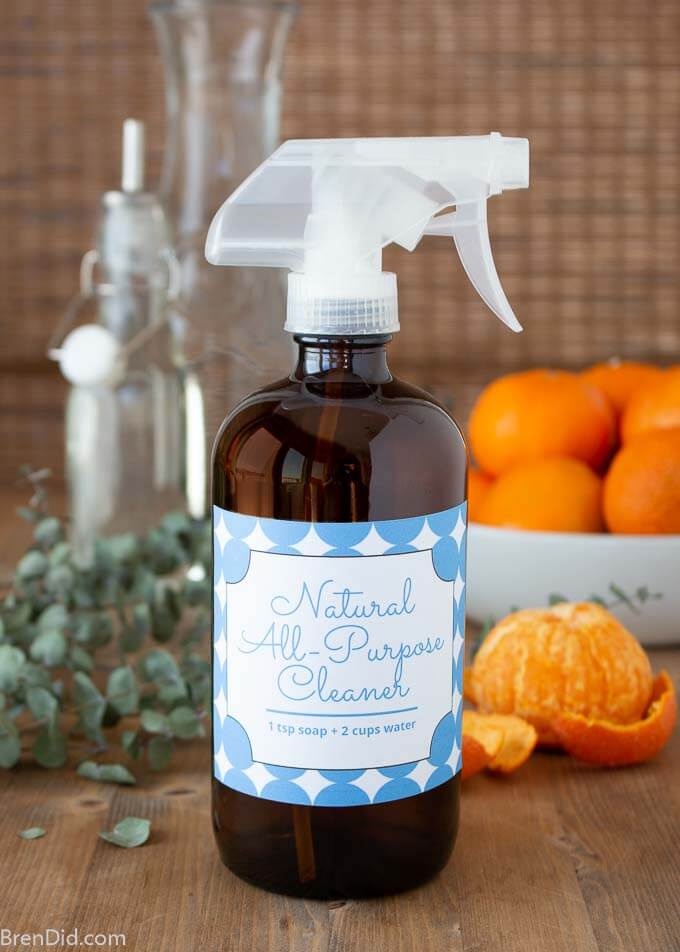
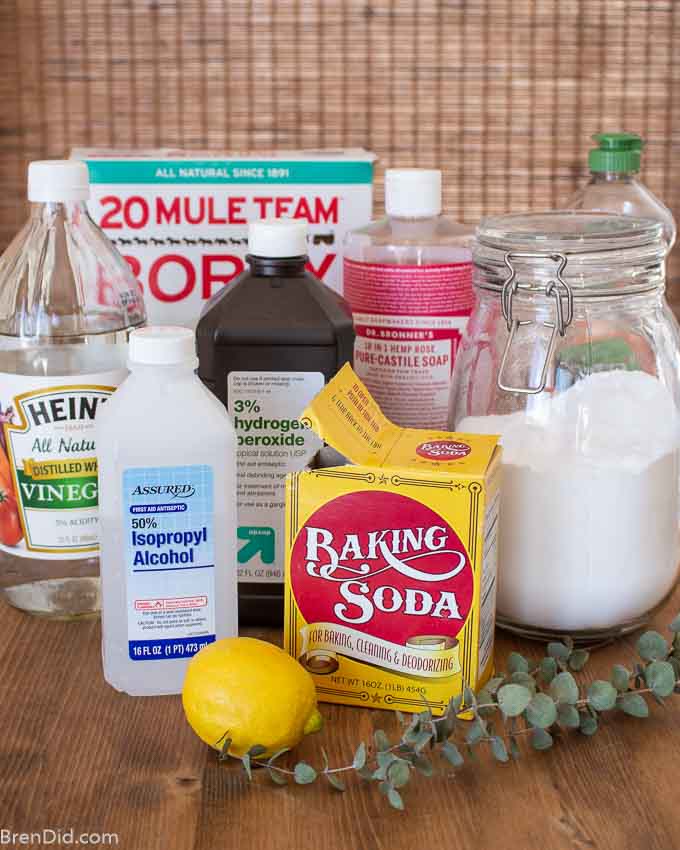
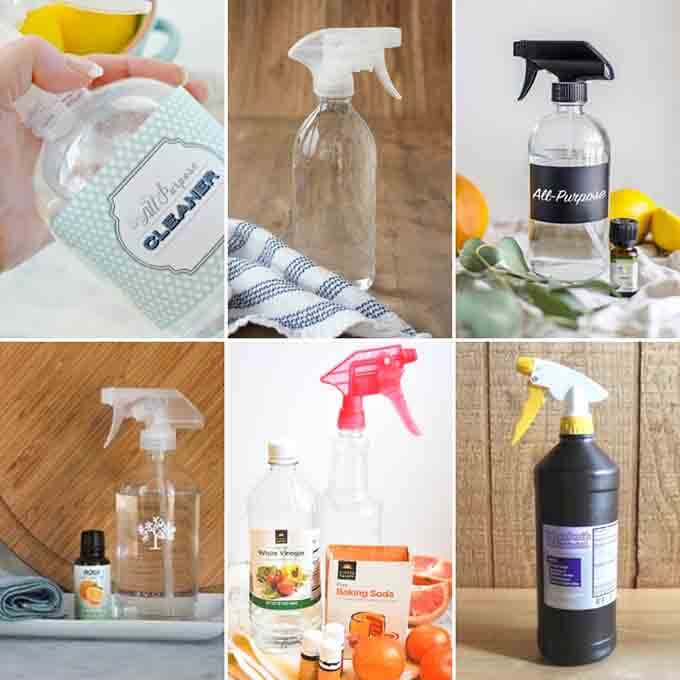
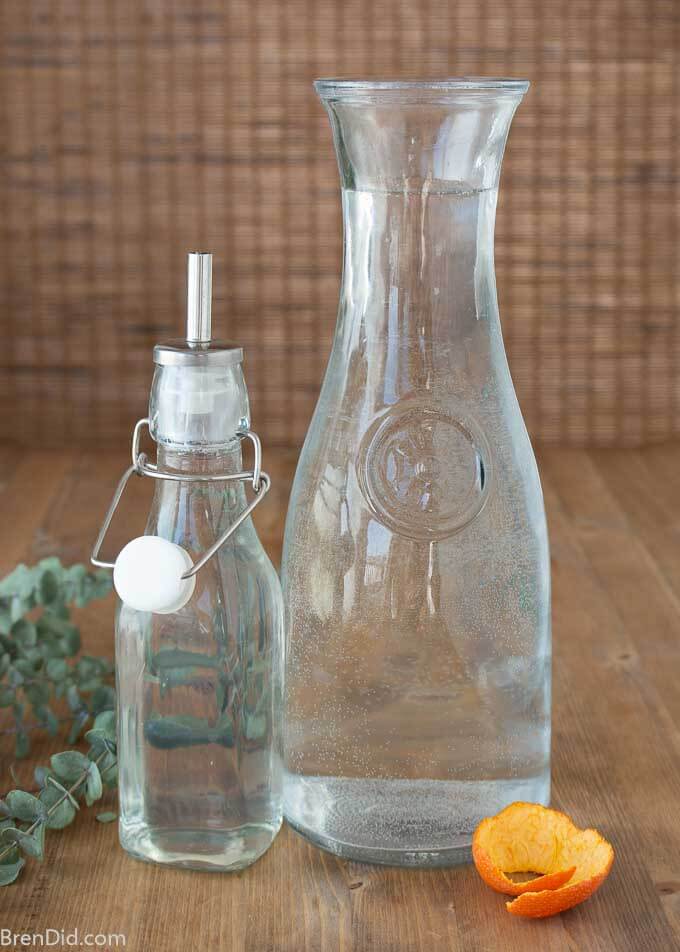


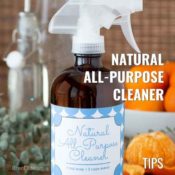
Liz
Thanks so much for this recipe! I use it (almost) *everywhere*.
I’ve started making this with Sal Suds and find that I need a LOT less of it than dish soap. A half or even a quarter teaspoon is plenty!
Unfortunately, I’ve also found that no matter what concentration I use in a spray bottle, it can leave my granite countertop a little smeary, and I end up having to rinse with water. (I use it as is everywhere else.) For daily cleaning, I find that the same ingredients, but MUCH more diluted with warm-to-hot water, work amazingly well on the granite. (I combine them in a large bowl or a bucket instead of a spray bottle.)
I almost never need to disinfect (I’m a vegetarian so no meat juices to clean up!), but when I do I use your recommendation of peroxide.
EB
I want to use your Homemade All-Purpose Cleaner recipe, the one with 2 simple ingredients. I don’t want to rinse, dry or buff. Your recipe calls for 1 tsp natural dish detergent. Can you recommend names of natural dish detergents?
Bren
EB, I prefer a detergent that is unscented (fee and clear if possible) and rated on the EWG Guide to Healthy Cleaning. Some examples: Seventh Generation Hand Dish Wash, Attitude unscented, and Full Circle Market Dish Soap, Free & Clear.
Ag
Really happy to someone finally calling out the BS “baking soda + vinegar” crowd, and doing ACTUAL research to come to their own conclusions. It’s depressing how many blogs will cite their own ignorance when dismissing “chemicals”, and in the same breath promote vinegar and baking soda as totally complimentary products, because they did the “research”. I’m 99% sure their research can be summed up as “soap makes bubbles > more soap makes more bubbles > more soap MUST be better, so more BUBBLES must be better > baking soda + vinegar = bubbles with attitude = srs cleaning pwr”
Misinformation everywhere. It’s uplifting to see someone using their brain.
Side note, regarding your detergent + vinegar recommendation — I was under the understanding that in general, soaps and detergents are formulated to be somewhat alkaline, as they perform better at higher pH levels. I’m not super comfortable with the soapmaking reaction, but I remember it (saponification via lye) being used to explain the alkaline ” preference” . I’ve encountered “recipes” for homemade rinse agents or laundry treatments using vinegar (ex- to combat mineral deposition on glasses) that also cite this rule of thumb and recommend keeping any acidic cleaning phases separate from detergent/alkaline phases.
Any thoughts on this? It was my understanding that vinegar/acids could reduce detergent effectiveness.
Thanks for putting the effort into this. content creators taking no responsibility for the BS they publish is the biggest flaw of the internet, so it’s great to see someone doing things right.
Bren
Ag, great question! Yes, vinegar (or other acids) are often used as rinse aids because they react with the soap/detergent to help remove residue. Vinegar breaks down or unsaponifies true soaps. However, it is my understanding that this issue does not apply to combining synthetic detergents with vinegar. Detergents have a different chemical makeup and do not react with the vinegar the same way. I generally only use detergent and vinegar together to “hold” the vinegar in place (like my homemade shower cleaner) or where the vinegar is used to deodorize (my upholstery cleaner). Hope this helps!
Annemarie
Can’t I mix these with hydrogen peroxide? As an disinfectant cleaner to kill bacteria and virus because covid19. Wouldn’t that ruin the effectiveness of this product if I mix it with hydrogen peroxide?
Bren
If you mix with hydrogen peroxide, the peroxide would be too diluted to kill bacteria/virus germs. I recommend cleaning your surface then using hydrogen peroxide to disinfect. I like to screw a spray top onto a bottle of 3% hydrogen peroxide for easy disinfecting.
Angie
Can I use the multi-purpose cleaner (one you used only dish detergent and water) for cleaning toilet and bathtub? Will they be actually disinfected or could vinegar solution afterwards do the job? What are your thoughts? Thank you so much for this recipe and all your research – saved a lot of us hours of work in internet trying to make sense of it all 🌷😊
Bren
The multipurpose cleaner can be used for any water-safe surface. I prefer to use my shower cleaner since it helps fight hard water stains and soapy build up. If you want to disinfect you can spray the toilet with 3% hydrogen peroxide and allow it to air dry. It’s my favorite natural disinfectant.
Anastacia
So what’s the best soap then??
Bren
Anastacia, you can use your choice of soap (the kind used for hand washing dishes in the sink). I also like using Sal’s Suds.
Sam
A good article that dispels many of the cleaning myths so often found online. Currently, I am using a scented Catile soap with distilled water, I only use 1.5 tablespoons per qt of water, (less than half the manufacturers recommend) so I have no film issues. Not a vinegar fan, but that along with distilled water & a few drops of dish soap make a fantastic window/stainless steel cleaner.
I’ll try your AP cleaner, but I’ll start out using less dish soap. I already use it as a floor cleaner & 2c to a teaspoon leave my floors sudsy.
Jessica
Thank you so much for this article. Its so helpful! If I melt kirks soap bar in the microwave then pour it into a bottle to store would that be ok? Would the Kirks soap go back to a solid form in the bottle after a day or 2? I would then dilute the measurements that you suggested with water and place it in a spray bottle to use on the surfaces. I’m new at this so not sure.
Bren
You can use liquid Castile soap but you can’t use melted solid soap. Good luck!
Ruthie Stuhlman
Hi Bren,
Great article. Thanks for all the research! Would Dawn concentrated work for the soap?
Bren
Yes, you can use Dawn or whatever handwashing dish detergent you have at home.
Crystal
Hi Bren, this post is 2 years old. Do you still use this recipe?
I’m looking forwarding to using this everywhere, since it will be safe for our kitchen and bathroom countertops.
Bren
Yes, I still use this recipe! Simple, quick, and effective!
Melissa
I have used dish soap and water to clean my home for years! It’s so fast and easy. I also use it on laundry stains and odors. Works great. 🙂
Raz
The first blog I’ve read where the writer understands chemistry.
Combining vinegar or lemon juice (acid), say, with sodium carbonate/bicarbonate (base) results in a salty water.
Lacey
Great article! I’ve been thinking of making DIY all-purpose spray cleaner for a while, since 5$ for a bottle of 97% water is a racket. Anywho, thanks for calling out the BS on a baking soda / water solution and other nonsense. (I’m scientist in real life and things like that make me roll my eyes. Hard.)
Bren
Thanks. Lacey! I’m glad to get the approval of a scientist! 🙂
Ben Pauley
Could you sub regular grain alcohol (like vodka) in place of rubbing alcohol of you wanted a slight boost to your mp spray?
Bren
Yes, just be sure not to use it on wood or other surfaces that would be damaged by alcohol.
Linden
Great post! I like to use soap, water, and a splash of alcohol for my all-purpose cleaner. I have found the alcohol makes it much easier to get a streak-free shine, with less buffing! I use the same ingredients for my spray mop, but with much less soap and alcohol, so as not to ruin the finish on my hardwood floors. It should also be noted that hydrogen peroxide should be kept in its original brown, opaque bottle, since sunlight is what causes it to break down. Fortunately, most spray tops fit on these bottles! Also, the residue/crystals left by borax and baking soda can clog spray nozzles. But the baking soda + water combo is a very effective kitchen sink scrub! And since vinegar reacts with it, I have used vinegar to actually remove that baking soda residue from non-rinse-able surfaces, like my oven!
Megan
Another amazing post Bren! Thank you, I was searching for a good multi-purpose cleaner but was running into the problem you mentioned that many contain vinegar or other ingredients not suitable for all surfaces. Two, questions about this recipe. What is the shelf life of this, can it go bad? Secondly, should we use a certain kind of water like distiller or filtered? What do you think about replacing some of the water with rose water to add some scent…?
Maurilia
Thanks so much for it breaking it all down. This is so informative. Can you tell us which kind of dish soap you prefer to use to make this all purpose cleaner?
Bren
Maurilia, I have used lots of different kids: Sal’s Suds, Seventh Generation, J.R. Watkins, etc. You can use whichever dish soap you like to use in your home.
Brie
So, after cleaning with a soap and water cleaning solution, once in a while … how often should i spray with hydrogen peroxide to disinfect? Also, do I mix that with water…. probably a stupid question but I’m new to this.
-brie
Bren
It depends on how often you want to disinfect. I rarely disinfect unless we’ve been sick (I’ll disinfect the bathrooms with hydrogen peroxide) or I’ve cut up a chicken and it was messy (I’ll spray a little hydrogen peroxide on the area). In general, a good wipe down with an all-purpose cleaner and a rag provides most of the cleaning needed in homes. Good luck!
Craig
Great article. Exactly what I was looking for. I’ve tried the borax and baking soda based cleaners and was disappointed because of the residue they left behind. I like your recipe for a simple, effective, safe, no rinse cleaner.
Bren
Thanks, Craig!